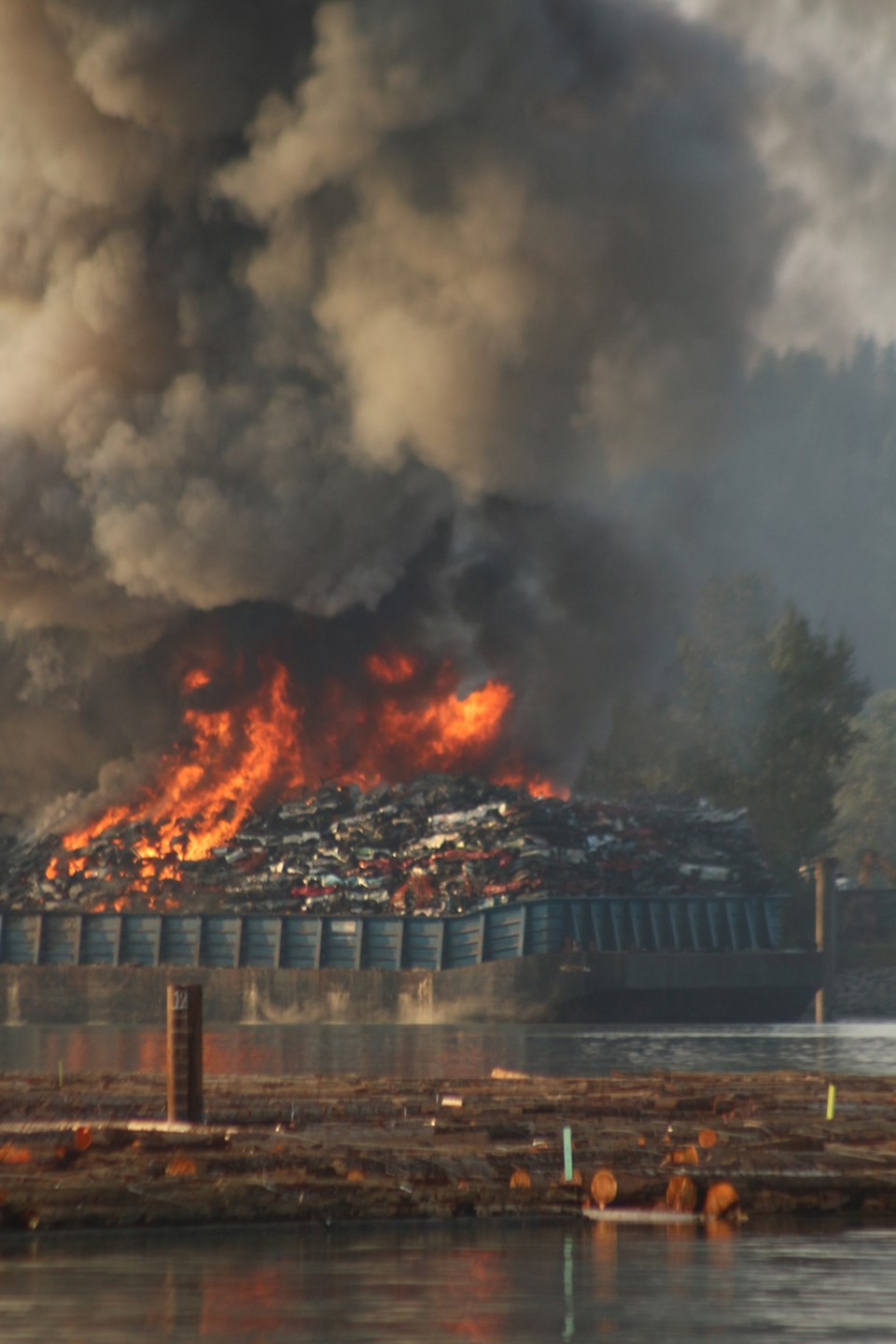A New Westminster councillor is concerned about the impacts a barge fire will have on fish in the Mighty Fraser – and suspects charges could be laid under the federal Fisheries Act.
Plumes of thick black smoke filled the skies on Friday as a barge carrying scrap metal burned on the shores of the Fraser River. Surrey and Vancouver firefighters poured water on a 76-metre barge carrying scrap metal for hours from the shore and from a fire boat and remained on-scene for more than 24 hours.
Coun. Patrick Johnstone, an environmental scientist, believes it’s likely there’s been a “significant introduction of deleterious substances” into fisheries habitat, which is an offence under the Fisheries Act. The barge was moored just north of the Pattullo Bridge on the Surrey side of the river when it caught on fire just after 4:30 a.m. on Aug. 10.
“That term ‘deleterious substances,’ I use on purpose. It’s actually the phrase in Section 36 of the Fisheries Act. It’s a very broadly defined term, deleterious substances – anything that is not good for fish,” he told the Record. “It’s kind of interesting because many things you might not think are deleterious substances are, including, for example, water. Treated water that comes out of your sink has chlorine in it, so potable water is actually a deleterious substance if you introduce a lot of it into the water course.”
Johnstone noted that when the city flushes its water mains, it puts special pads over storm drains to remove chlorine before the water enters the system and kills the fish.
“With emergency firefighting we don’t stand around when something is on fire to decide whether spraying water on it is bad for fish. There’s human health and life protection kinds of concerns,” he said. “To me, the responsibility in something like that more relies on the person who stored a bunch of flammable, hazardous material in the water without an adequate plan for addressing an emergency that happened on it. The firefighters aren’t to blame for pouring water on the situation. The blame really stands in not storing your materials in a secure way so that when an incident happens you end up introducing deleterious substances.”
While Johnstone isn’t privy to the details of the barge fire, he believes there’s been a violation under the federal Fisheries Act and suspects charges may be laid under the act.
“I noticed the smell. We all noticed what happened to the air quality and that concerned a lot of people, but my reaction immediately was, what’s happening in the river?” Johnstone said. “The salmon are running right now. It’s a bad time to have a spill of substances into the river as salmon stocks are moving up the river.”
In a posting on the Record’s Facebook page, Peter MacMartin said the community needs information about the fire’s impact on the river. With theSockeye Salmon run underway and with warmer waters in the river, he fears exposure to pollutants during the run could have an impact on the numbers and future health of this year’s run and next year’s smolts.
Fisheries and Oceans could not be reached for comment before the Record’s deadline.
Johnstone said the fire doesn’t come as a surprise as there have been a number of fires involving auto wreckers along the river in the last couple of years, including Mitchell Island in Richmond in 2017. He questions the wisdom of storing volatile, flammable contaminants next to the river or stockpiling them on a barge on the river.
“There is probably not a lot of liquids in the car, but any time you have a fire, a hot fire like that, you’ve got plastics, you’ve got metals, you’ve got paints. You mix that with water and run it off – a whole bunch of substances are going to go into the water,” he said.
Johnstone is concerned about the potential impacts that incidents of this type could have on the Fraser River and the salmon.
“We need industrial land in the city but we also need to make sure when we are putting industrial land next to the most important water course in the province that we taking extra measures to make sure the salmon are safe,” he said. “It’s not just the salmon, it’s the other fish in the river and it’s also the orcas downstream that live off the salmon.”
Schnitzer Steel, an international metal recycling and steel manufacturer based in Portland, Oregon, leases the Surrey waterfront site from the Port of Vancouver. The scrap metal on the barge, which included flattened cars and assorted light iron products such as washers and dryers, was destined for Tacoma, Washington.
“All vehicles were processed for end-of-life and hence all fluids removed before barge loading,” company spokesperson Colin Kelly said in an email to the Record. “Plastic and cushions would still be in the vehicles.”
Kelly said the cause is still under investigation, both internally by Schnitzer and by the applicable agencies. He said the company has been in contact with the Port of Vancouver/Vancouver Fraser Port Authority, Fisheries and Oceans and federal and provincial environmental ministries about the fire.
According to Kelly, Schnitzer has done some tests on the water quality near the site and is providing those details to the regulators.
“We do not believe that this incident will have any impact on water quality in the Fraser River,” he said. “This was a short event, and the river flow is a positive mitigating factor.”
Danielle Jang, media relations and government affairs advisor for the Port of Vancouver, said the port will be discussing the incident and the procedures that took place with key stakeholders in the coming weeks to determine any action that may be required. In regards to emergency plans, she said tenants are required to carry out regular safety inspections and are required to observe all applicable rules, regulations and directions of building inspectors, health, fire and other municipal officers and regulatory agencies.



